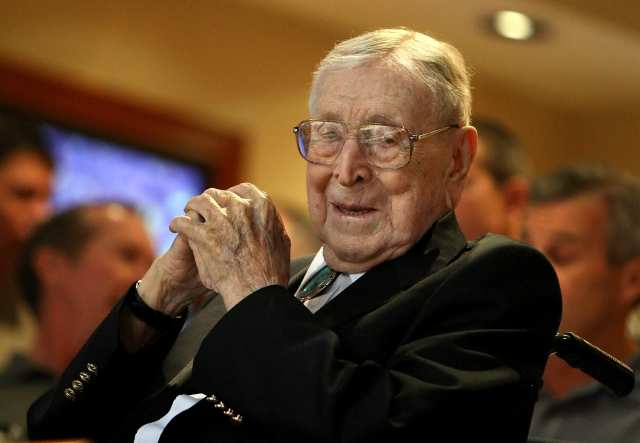John R. Wooden died on June 4, 2010. He was 99 years old. That’s 99 amazing years for a man who I consider as the greatest coach in sports and one of the most influential people in the world.
I could recite all of Wooden’s accomplishments, but his impact went beyond statistics, records and championships. He taught us the game of life and showed us the blueprint on how to become successful.
I had the great honor of meeting Coach Wooden in March of 1995. I remember it well.
To this day, it was the best experience I’ve ever had as a journalist. I still have the clip, and it is stored in my safety box.
I will never grow tired of telling my story and my time with the legendary and iconic coach, who I found to be personable, humble, honest, direct, interesting, full of wisdom and highly intelligent.
It was the week of the first round of the NCAA Tournament and Coach Wooden was doing a promotional appearance at what used to be Coast Federal Bank (now Chase) in La Crescenta, Calif. I couldn’t pass up the opportunity so I called the bank’s public relations person and scheduled a sit-down interview with Coach.
It was around lunchtime when I met Coach. He was 85 years old at the time. His body was moving slow but his mind was as sharp as nails. I asked him how his health was, and he said he was doing fine. He talked about his grandchildren a lot and told me how proud he was to have lived long enough to see them grow up.
We discussed various subjects, from UCLA’s chances of winning the NCAA championship (which the Bruins did that season, led by Ed and Charles O’Bannon) to why Coach Wooden thinks the dunk show should be disallowed to his disdain for too much showmanship on the court. Coach Wooden strongly believed the slam dunk has become a detriment to the game because players tend to pass up the simple and basic play in favor of the more crowd-pleasing aerial acrobatic.
Wooden said, “I think the dunk has brought on an inordinate amount of showmanship and that has taken away from team play. For the most part everything is fine if they just call the rules the way they are written and understand the purpose of the rules.”
When I asked him about the state of college basketball, he explained: “I think the players are getting better. I think the quality of team play has not. Maybe it’s a natural result of the players being better that the tendency is sort of let them be on their own because they are so good individually, but that in turn takes away from team play. The thing that concerns me about [college basketball] is the considerable taunting. And I don’t like that at all. I think television has brought on entirely too much showmanship, and I think they are permitting many aspects of the game to become too physical coming down from the pros.”
And then I asked his opinion about college underclassmen entering the NBA or the pro ranks, and he believed that, in most cases, a player would be better served completing his education.
“Those that decide not to (stay in school) and receive tremendous multi-million dollar contracts, you can’t blame them. But at the same time, they are not under hardship,” Wooden said. “They are getting a complete education free. It doesn’t cost them anything. I think if they would finish their education, they would be more mature and better able to handle what the responsibilities and obligations that come along with having so much money.”
Coach Wooden was all about mastering the fundamentals, and who can argue the results. The man won 10 national championships and built college basketball’s greatest dynasty. He stressed it to all his players, whether it’s UCLA All-Americans Kareem Abdul-Jabbar (although Coach Wooden still calls him Lew), Bill Walton, Gail Goodrich, Jamaal Wilkes and Marques Johnson or role players such as Mike Warren, Lynn Shackelford and Brad Holland. Repetition and practice was important to Wooden. He always made sure his teams practiced well because the preparation aspect of the game was the key to game execution.
“Be quick, but don’t hurry,” Wooden preaches.
“Failing to prepare is preparing to fail,” Wooden stresses.
“Be humble, be grateful, but be careful,” Wooden advises.
“Happiness begins when selfishness ends,” Wooden teaches.
Preparation is something that I always carry with me, whether I’m coaching my youth basketball team or working on a story. I relay to my teams that practice is just like doing your school homework. When you do your homework and study for your exams, the pressure of failing doesn’t exist on the day of the test. In basketball, when you work on your fundamentals and improve your skills, there is no reason to be fearful of failing or losing. I always tell my boys, “Do your best and live with the results.”
The most important aspect that I took from my time with Coach Wooden is that simplicity is the best way to eliminate life’s complications. Sometimes we fill our lives with unnecessary stress. By keeping things simple, we get rid of the confusion and see a clearer picture of our goals and what we are trying to accomplish.
Thank you, Coach Wooden.
